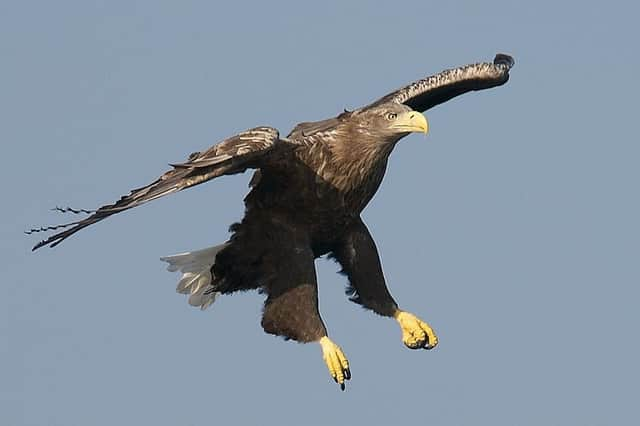New charity aims to restore missing Scots species


The idea of reintroducing animals that were hunted to extinction north of the border is not new. The last white-tailed eagle, or sea eagle, in the UK was shot in Shetland in 1916. The birds were then successfully reintroduced to Scotland from 1975.
Scottish Natural Heritage (SNH) is awaiting a Scottish Government decision on whether beavers will be allowed to be reintroduced to the wild following a pilot scheme in Argyll.
Advertisement
Hide AdAdvertisement
Hide AdThere are even hopes to reintroduce lynx, a big cat that became extinct in the British Isles 1300 years ago.
The Lynx UK Trust wants to reintroduce the animals to selected locations, with an area near Huntly in Aberdeenshire identified as a potential location.
Meanwhile, semi-domesticated reindeer can happily be found living in the Cairngorms National Park.
The concept of reviving biodiversity via native animals and plants has become an increasingly popular form of environmentalism in recent years.
This new enthusiasm is reflected by a new charity, Rewilding Britain, which launched in July and campaigns to restore nature and reintroduce missing species.
This week, it appointed David Balharry, a branch head in the agriculture and rural development division at the Scottish Government, as its Scotland director as it seeks to establish itself as force north of the border.
“Unlike many other parts of the UK, we still have areas free from industrialisation, urbanisation and intensive management,” he said. “We’re in danger of allowing our natural assets to diminish if we don’t take action now.
“The time is right for new thinking. Scotland is growing in confidence and looking for opportunities. Community empowerment and land reform are on the agenda.”
Advertisement
Hide AdAdvertisement
Hide AdGeorge Monbiot, a columnist with The Guardian and an author of several books of the subject, is one of the leading proponents on rewilding.
“We live in one of the most depleted nations in Europe, that has lost almost all its forests and its large mammal and bird species,” he said.
“Restoring our broken ecosystems and missing wildlife would enrich not just the natural world, but also our own lives. We would no longer have to travel halfway round the world for magnificent experiences with nature.”
Around 60 per cent of species native to the UK are currently in decline, according to the charity.
“We need a new approach to nature that repairs ecological damage, brings back wildlife and ensures clean air, fresh water, flood prevention, better carbon storage and so on,” said a spokeswoman.
“That means expanding native forests and other habitats on a large scale and helping missing species return.
“This approach, coupled with meaningful land reform, is needed to provide new opportunities for rural communities who are currently dependent on subsidies and the whims of landowners. These opportunities could be in eco-tourism outdoor recreation, wood and timber, crafts and areas as yet unimagined.
“We exist to build support for this new approach. And we want to create the conditions for informed decisions on whether or not to reintroduce important species, such as lynx, beaver and wild boar, which have been hunted to extinction. We’re a part of nature. Our well-being depends on nature functioning and thriving.”
Advertisement
Hide AdAdvertisement
Hide AdAn SNH spokeswoman said: “We agree that many of Scotland’s wild areas are heavily grazed and eroded and a re-wilding approach in these places could offer significant biodiversity gains, in turn benefiting tourism, woodland production and employment for the people of Scotland by maintaining a rich and diverse natural environment.
“We‘ve already had a number of highly successful national reintroductions in Scotland, including sea eagles and red kites, as well as more local reintroductions such as the scarce woolly willow. The Scottish Government is also currently considering the possibility of reintroducing Eurasian beaver.
“But re-wilding isn’t just about releasing large animals and, in fact, doesn’t have to include reintroduced species at all. Re-wilding is also about regenerating natural woodland or allowing areas of coast that flood naturally to flood again, and creating wildlife corridors.”